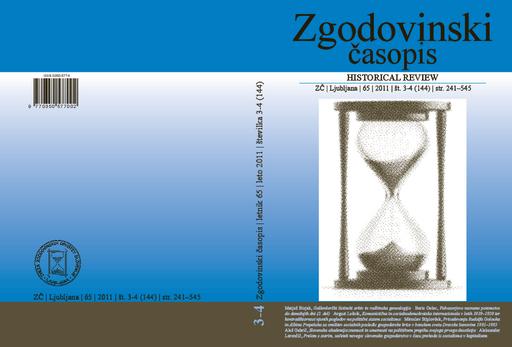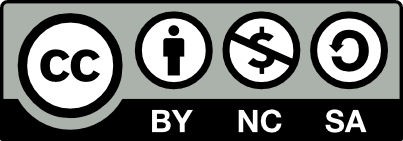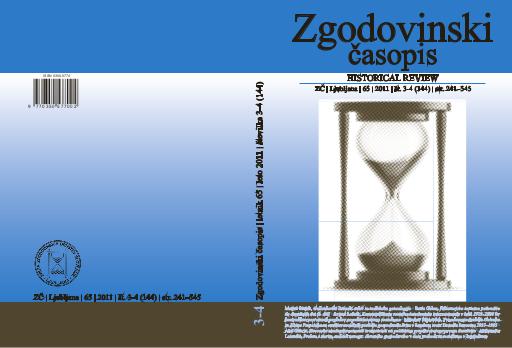/
Serijske publikacije
/
Zgodovinski časopis
Prelom s starim, začetek novega: slovensko gospodarstvo v času prehoda iz socializma v kapitalizem

Avtor(ji):Aleksander Lorenčič
Soavtor(ji):Peter Štih (odg. ur.), Dušan Mlacović (ur.), Bojan Balkovec (teh. ur.), ives Sulič Dular (prev.), Niko Hudelja (prev.)
Leto:2011
Založnik(i):Zveza zgodovinskih društev Slovenije, Ljubljana
Jezik(i):slovenščina
Vrst(e) gradiva:besedilo
Ključne besede:Jugoslavija, Slovenija, gospodarstvo, razpad, tranzicija, kriza, okrevanje, Yugoslavia, Slovenia, economy, dissolution, transition, crisis, recovery
Avtorske pravice:

To delo avtorja Aleksander Lorenčič je ponujeno pod Creative Commons Priznanje avtorstva-Nekomercialno-Deljenje pod enakimi pogoji 4.0 Mednarodna
Datoteke (1)

Ime:ZC_2011_3-4.pdf
Velikost:3.88MB
Format:application/pdf
Stalna povezava:https://hdl.handle.net/11686/file18353
Opis
Potem ko so se razmere v slovenskem gospodarstvu
v drugi polovici osemdesetih let 20.
stoletja iz leta v leto slabšale in ko je postalo
jasno, da so razvojne možnosti za slovensko
gospodarstvo v okviru tedanjega sistema omejene,
se je aprila leta 1990 z večstrankarskimi
volitvami tudi uradno začela tranzicija. Poleg
tega, da se je Slovenija v prvem obdobju tega
izredno zahtevnega procesa spopadala z recesijo,
makroekonomsko nestabilnostjo in upadanjem
življenjskega standarda, je bila naloga njene
ekonomske politike vzpostaviti vse elemente in
institucije za uspešno delovanje demokratične
in v tržno gospodarstvo usmerjene države.
Metapodatki (12)
- identifikatorhttps://hdl.handle.net/11686/35032
- naslov
- Prelom s starim, začetek novega: slovensko gospodarstvo v času prehoda iz socializma v kapitalizem
- A Break with the Old and the Beginning of Something New: Slovene Economy during the Period of Transition from Socialism to Capitalism
- ustvarjalec
- Aleksander Lorenčič
- soavtor
- Peter Štih (odg. ur.)
- Dušan Mlacović (ur.)
- Bojan Balkovec (teh. ur.)
- ives Sulič Dular (prev.)
- Niko Hudelja (prev.)
- predmet
- Jugoslavija
- Slovenija
- gospodarstvo
- razpad, tranzicija
- kriza
- okrevanje
- Yugoslavia
- Slovenia, economy
- dissolution
- transition
- crisis
- recovery
- opis
- Potem ko so se razmere v slovenskem gospodarstvu v drugi polovici osemdesetih let 20. stoletja iz leta v leto slabšale in ko je postalo jasno, da so razvojne možnosti za slovensko gospodarstvo v okviru tedanjega sistema omejene, se je aprila leta 1990 z večstrankarskimi volitvami tudi uradno začela tranzicija. Poleg tega, da se je Slovenija v prvem obdobju tega izredno zahtevnega procesa spopadala z recesijo, makroekonomsko nestabilnostjo in upadanjem življenjskega standarda, je bila naloga njene ekonomske politike vzpostaviti vse elemente in institucije za uspešno delovanje demokratične in v tržno gospodarstvo usmerjene države.
- The state of Slovene economy became increasingly worse in the second half of the 1980s. Once it became obvious that the possibilities of economic development in Slovenia were quite limited within the then existing system of government the multiparty elections of April 1990 heralded the official beginning of the period of transition. During the initial period of this extremely demanding process Slovenia had to battle recession, macroeconomic instability, and a decreased standard of living. Its economic policy focused primarily on establishing elements and institutions required for a successful operation of the country intent on market economy.
- Prior to its proclamation of an autonomous and independent state in 1991, Slovenia was a part of the Yugoslav federation and of its economic system based on public ownership and planned economy. In many respects, however, its initial position was more favorable than that of other countries in transition. By that time, Slovenia had namely developed many market elements. Its trading of goods was not limited solely to Eastern markets and its technological development was already on a higher level than in other socialist countries. Since the formation of prices and production had already largely adopted the principles of market economy politics played a less pronounced role in economic activities; contrary to this, the distinct influence of politics in human resources policy had been felt until the last days of the Yugoslav federation. Requests for change, which officially started in the spring of 1990, had been increasingly voiced since the second half of the 1980s. In the 1990-1992 period, Slovenia held a plebiscite, proclaimed independence, experienced a ten-day war, became internationally recognized, and ultimately became an autonomous state. The decision to become an autonomous and independent country enabled Slovenia to start implementing its own economic policy and thus assume responsibility for its economic development. The priority during this first phase of transition was to establish essential elements and institutions necessary for a successful function of a democratic country governed by the rule of law. Slovenia was among the first countries that were able to successfully overcome the period of transformational depression so typical of transitional economies at the beginning of the 1990s. The recovery of its economic growth and invigoration of domestic demand started to take place already in the middle of 1993. In a relatively short time it exceeded its pre-transitional level of economic activities; the level from 1990 was surpassed in 1996, and the level from 1987 in 1998. In the first half of the 1990s, the young country also managed to become a member of almost all prominent economic associations. There were marked structural shifts in ownership and scale structures. The activity-based added value structure indicated a decrease in industry and an increased importance of the service sector. As in other countries in transition, the most burning difficulties concerned the process of privatization. But Slovenia successfully overcame the transition from socialist to capitalist economy, with its economy becoming increasingly competitive and comparable to developed market economies.
- založnik
- Zveza zgodovinskih društev Slovenije
- datum
- 2011
- tip
- besedilo
- jezik
- Slovenščina
- jeDelOd
- pravice
- licenca: ccByNcSa
